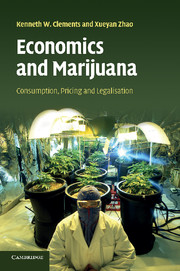Book contents
- Frontmatter
- Contents
- List of figures
- List of tables
- About the authors and contributor
- Acknowledgements
- 1 Introduction
- 2 Microeconometric evidence on marijuana consumption
- 3 The pricing of marijuana
- 4 More on the economic determinants of consumption
- 5 Decriminalising and legalising marijuana
- 6 Are Australians unique?
- 7 Perspectives
- Index
5 - Decriminalising and legalising marijuana
Published online by Cambridge University Press: 19 January 2010
- Frontmatter
- Contents
- List of figures
- List of tables
- About the authors and contributor
- Acknowledgements
- 1 Introduction
- 2 Microeconometric evidence on marijuana consumption
- 3 The pricing of marijuana
- 4 More on the economic determinants of consumption
- 5 Decriminalising and legalising marijuana
- 6 Are Australians unique?
- 7 Perspectives
- Index
Summary
Introduction
Marijuana-related policies and legislation have long been controversial topics for many countries around the world. The issues involved are complex and have health, social, economic and political dimensions. At the centre of the debate is whether legal sanctions are the best way to reduce use of the drug and the harm associated with this use. Advocates for relaxing marijuana legislation argue that legal sanctions have not been effective in reducing use and the associated harm, and that law enforcement resources are better spent on fighting the use of harder drugs. They also argue that a criminal charge is too severe a penalty for a minor marijuana offender who may otherwise be a law-abiding person. There are also concerns that young marijuana users may be unnecessarily exposed to dealers of harder drugs when marijuana is illegal. Of course, there has also been the ethical argument for individual liberty (Hall, 1997). However, opponents argue that liberalising marijuana laws would send a signal indicating that it is acceptable to use the drug. They are also worried that easier access to marijuana may provide a gateway for users to shift to harder drugs.
Although there is a spectrum of policy options ranging from total prohibition, prohibition with civil penalties for minor offences, partial prohibition and regulation to full legalisation, much of the current debate surrounds legislative details at the prohibition end of the spectrum (Commonwealth of Australia, 1994). Indeed, throughout the past decades, countries such as the Netherlands, the US and Australia have introduced legislative reforms or guidelines reducing penalties for possession of small amounts of marijuana.
- Type
- Chapter
- Information
- Economics and MarijuanaConsumption, Pricing and Legalisation, pp. 235 - 349Publisher: Cambridge University PressPrint publication year: 2009

